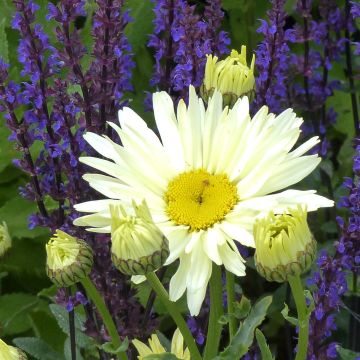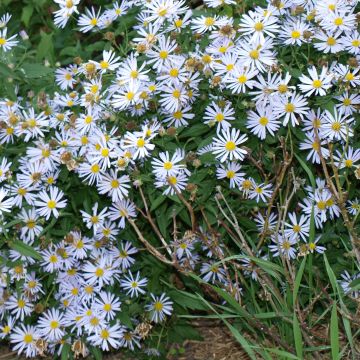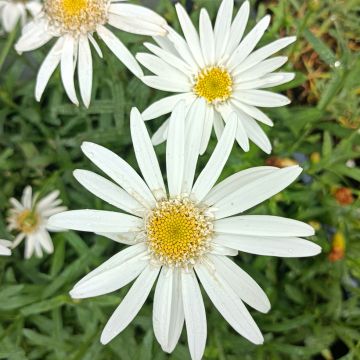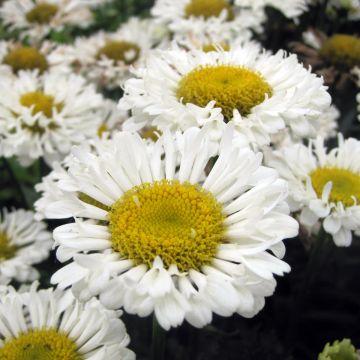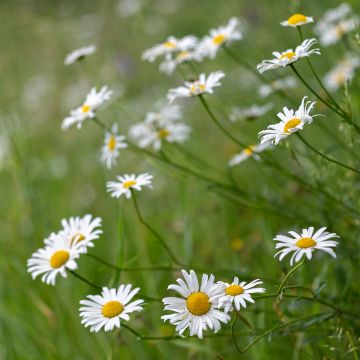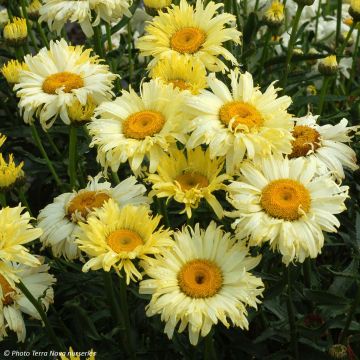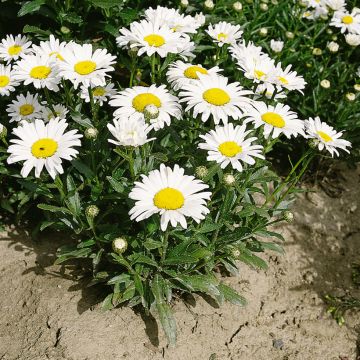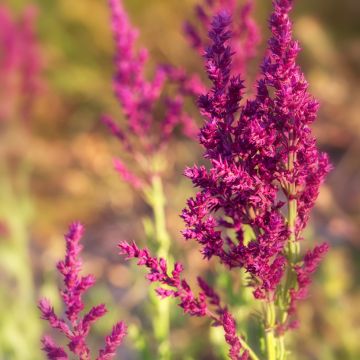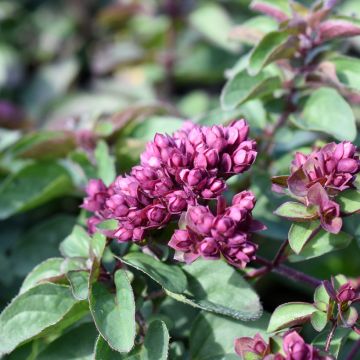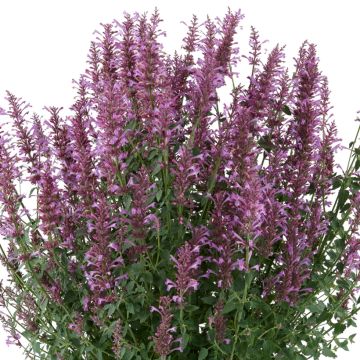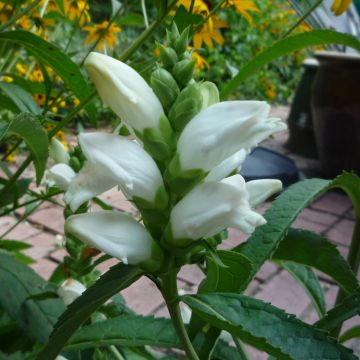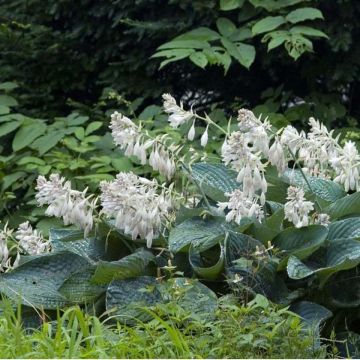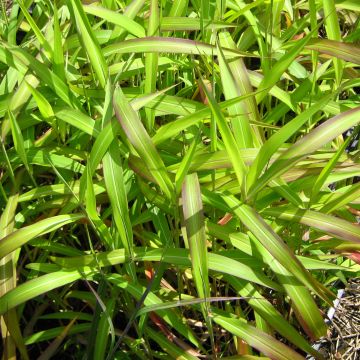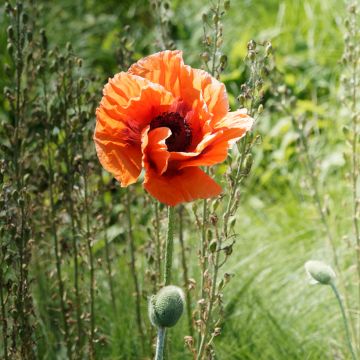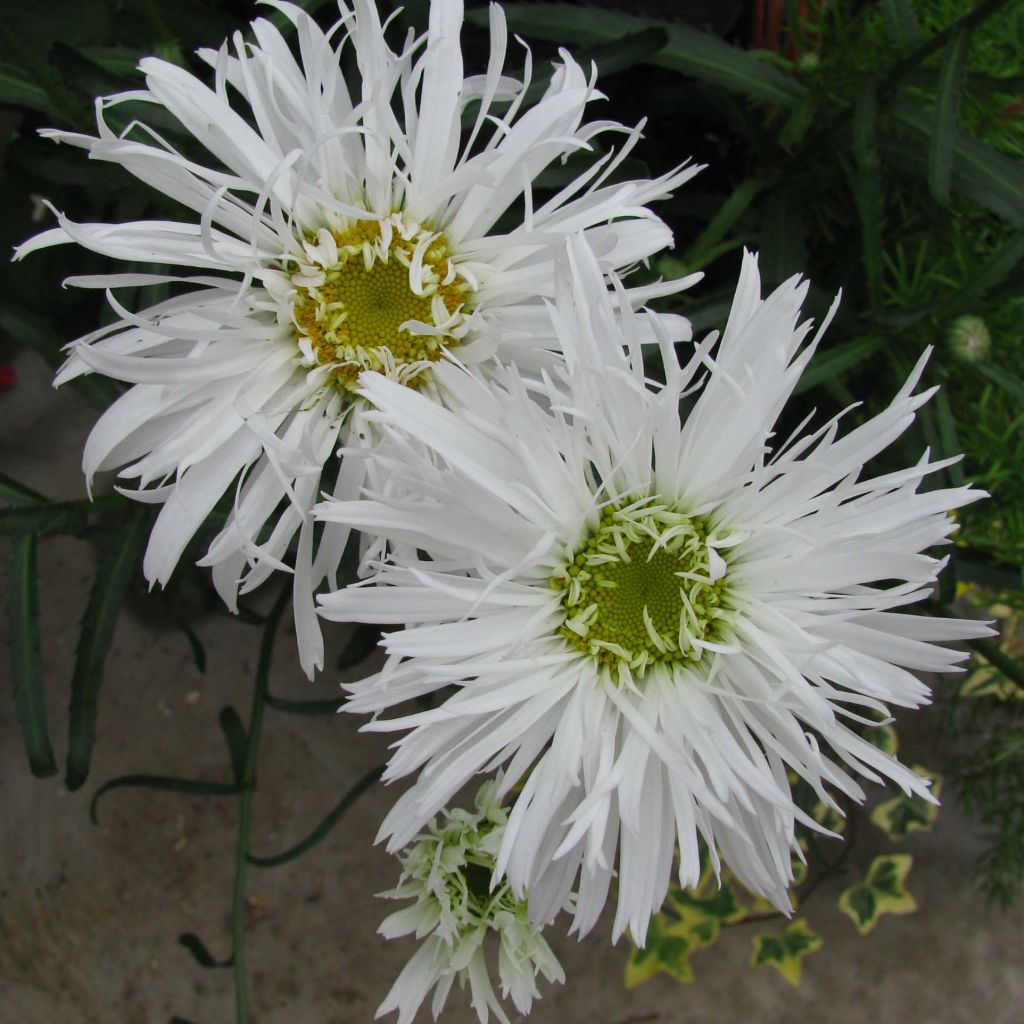

Leucanthemum Aglaia - Grande Marguerite
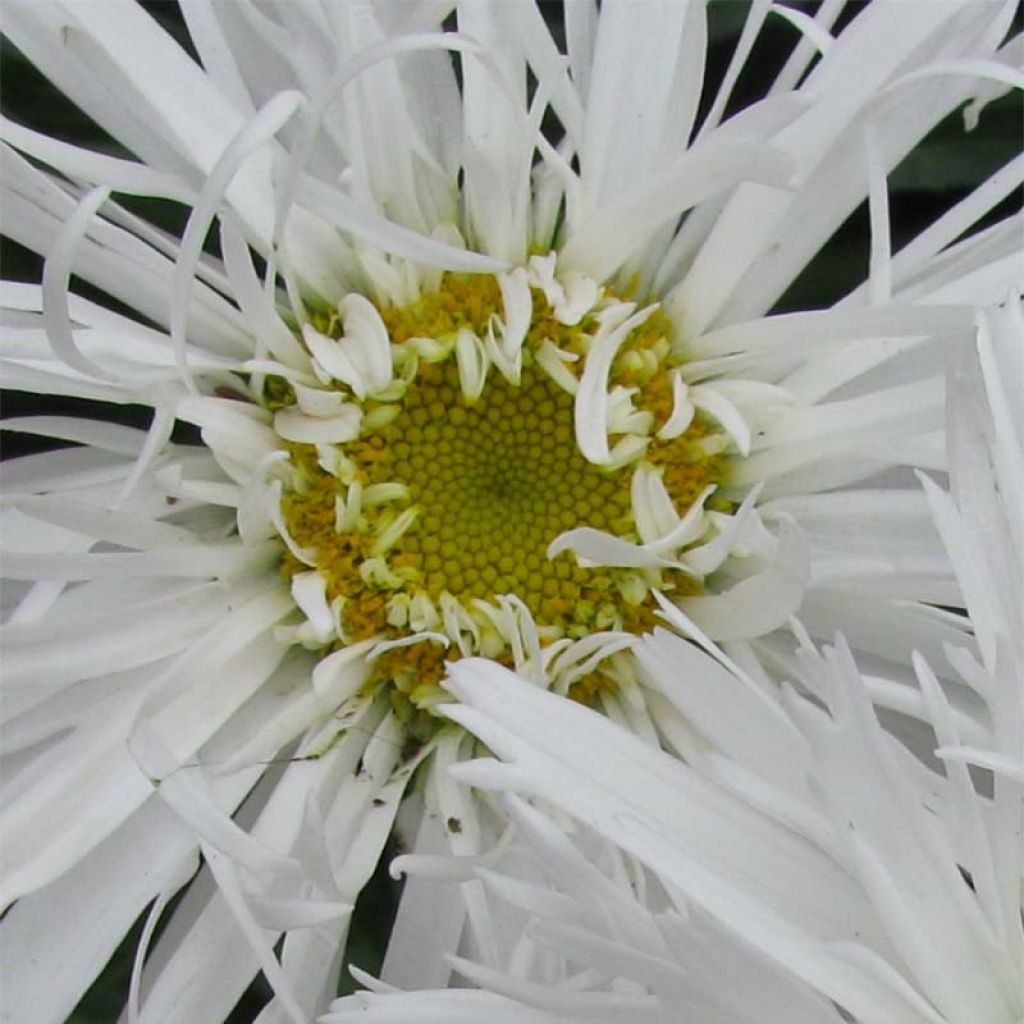

Leucanthemum Aglaia - Grande Marguerite
Leucanthemum superbum Aglaia - Shasta Daisy
Leucanthemum maximum x superbum Aglaia
Shasta Daisy
This item cannot be shipped to the selected country
Delivery charge from €5.90
More information
Schedule delivery date,
and select date in basket
This plant carries a 12 months recovery warranty
More information
We guarantee the quality of our plants for a full growing cycle, and will replace at our expense any plant that fails to recover under normal climatic and planting conditions.
From €5.90 for pickup delivery and €6.90 for home delivery
Express home delivery from €8.90.
Does this plant fit my garden?
Set up your Plantfit profile →
Description
Leucanthemum x superbum 'Aglaia' is a very beautiful variety of large daisy with a very modern style, appreciated for its multitude of flowers, the uniqueness of its flowering and its robustness. The plant forms a compact clump, ideal for decorating small spaces, and offers double and tousled flower heads. The ligules, sparkling white and very fringed, surround a small yellow central disc. Unique, light and seductive flowers, enhanced by the arrival of butterflies from July to September. This sturdy perennial easily thrives in any soil that is not too dry, in a sunny or semi-shaded locations. Its flowers are superb in bouquets.
The genus Leucanthemum belongs to the aster family. 'Aglaia' is a horticultural hybrid originating from Leucanthemum x superbum, the well-known large daisy. This variety forms a compact and bushy clump, taller than wide, measuring 60 to 70 cm (24 to 28in) in height and spreading over 40 to 50 cm (16 to 20in), with moderately fast growth. It forms a clump composed of numerous stems with small, deciduous leaves, originating from a large basal rosette. The flowering occurs from July to September, in the form of large solitary heads measuring 9 cm (4in) in diameter, with pure white ligulate flowers that are finely and strongly fringed, with a frayed appearance. These are arranged in multiple crowns around a discreet yellow centre. The basal leaves are dark green, alternate with a regularly toothed edge, and are almost fleshy. The plant reaches its full maturity in three to five years and can live for several years. It is recommended to regularly divide this relatively short-lived variety.
This summer daisy, which is very suitable for making bouquets, will be perfect in a country-style border or in a natural garden, in a meadow under fruit trees or at the back of the garden. 'Aglaia' is a reliable choice, and its sparkling flowers are among the whitest that can be found among Leucanthemum. In daisies, one does not find extravagant colours, but it is the structure of the flowers that stands out. Accompany these flowers with that of cosmos, combine them with peonies, columbines, asters, blue lupins, campanulas or snapdragons, for example. Be creative with this flower, in the garden or in a vase in the house, to produce a delightful and unique display.
Report an error about the product description
Leucanthemum superbum Aglaia - Shasta Daisy in pictures
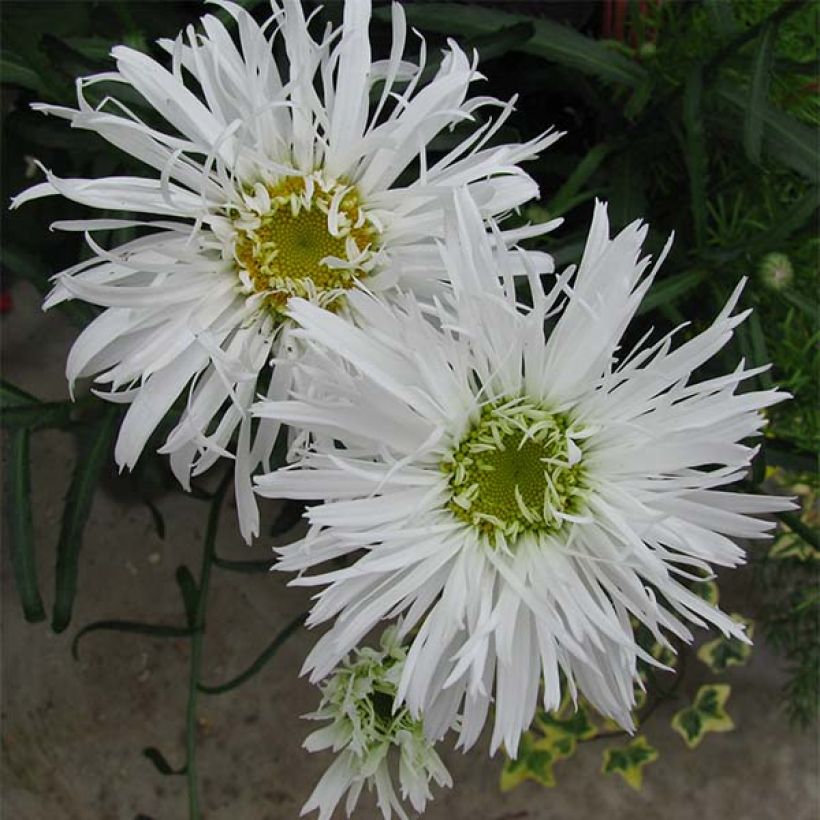

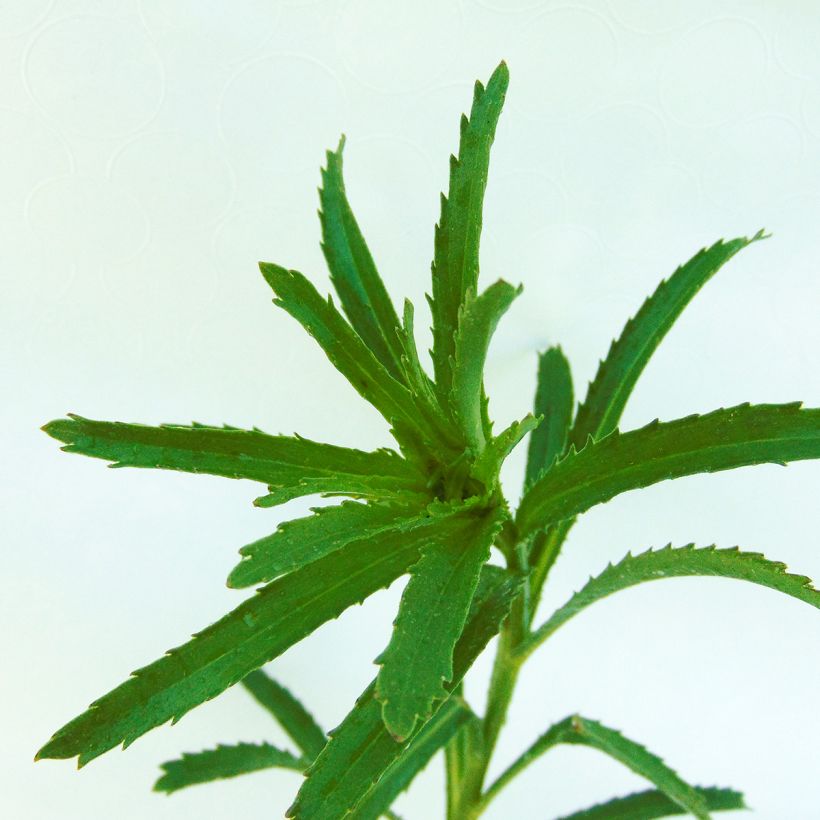

Flowering
Foliage
Plant habit
Botanical data
Leucanthemum
maximum x superbum
Aglaia
Asteraceae
Shasta Daisy
Cultivar or hybrid
Other Leucanthemum - Marguerite
Planting and care
Plant the Shasta Daisy 'Aglaia' in ordinary but deep soil, which is well prepared and preferably enriched with humus, and is moist but not too dry in spring and autumn. To achieve good drainage, add a little loamy sand to the planting substrate. This plant does not have any particular requirement for soil pH. It will thrive in a sunny position but also tolerates semi-shade. It can withstand temperatures down to -29°C (-20.2°F). Remove dead foliage in spring. This daisy can sometimes be attacked by aphids, snails, and may have foliar spots, without threatening its survival. Divide the clumps every 5 years to regenerate the plant.
Planting period
Intended location
Care
-
, onOrder confirmed
Reply from on Promesse de fleurs
Summer flowering perennials
Haven't found what you were looking for?
Hardiness is the lowest winter temperature a plant can endure without suffering serious damage or even dying. However, hardiness is affected by location (a sheltered area, such as a patio), protection (winter cover) and soil type (hardiness is improved by well-drained soil).

Photo Sharing Terms & Conditions
In order to encourage gardeners to interact and share their experiences, Promesse de fleurs offers various media enabling content to be uploaded onto its Site - in particular via the ‘Photo sharing’ module.
The User agrees to refrain from:
- Posting any content that is illegal, prejudicial, insulting, racist, inciteful to hatred, revisionist, contrary to public decency, that infringes on privacy or on the privacy rights of third parties, in particular the publicity rights of persons and goods, intellectual property rights, or the right to privacy.
- Submitting content on behalf of a third party;
- Impersonate the identity of a third party and/or publish any personal information about a third party;
In general, the User undertakes to refrain from any unethical behaviour.
All Content (in particular text, comments, files, images, photos, videos, creative works, etc.), which may be subject to property or intellectual property rights, image or other private rights, shall remain the property of the User, subject to the limited rights granted by the terms of the licence granted by Promesse de fleurs as stated below. Users are at liberty to publish or not to publish such Content on the Site, notably via the ‘Photo Sharing’ facility, and accept that this Content shall be made public and freely accessible, notably on the Internet.
Users further acknowledge, undertake to have ,and guarantee that they hold all necessary rights and permissions to publish such material on the Site, in particular with regard to the legislation in force pertaining to any privacy, property, intellectual property, image, or contractual rights, or rights of any other nature. By publishing such Content on the Site, Users acknowledge accepting full liability as publishers of the Content within the meaning of the law, and grant Promesse de fleurs, free of charge, an inclusive, worldwide licence for the said Content for the entire duration of its publication, including all reproduction, representation, up/downloading, displaying, performing, transmission, and storage rights.
Users also grant permission for their name to be linked to the Content and accept that this link may not always be made available.
By engaging in posting material, Users consent to their Content becoming automatically accessible on the Internet, in particular on other sites and/or blogs and/or web pages of the Promesse de fleurs site, including in particular social pages and the Promesse de fleurs catalogue.
Users may secure the removal of entrusted content free of charge by issuing a simple request via our contact form.
The flowering period indicated on our website applies to countries and regions located in USDA zone 8 (France, the United Kingdom, Ireland, the Netherlands, etc.)
It will vary according to where you live:
- In zones 9 to 10 (Italy, Spain, Greece, etc.), flowering will occur about 2 to 4 weeks earlier.
- In zones 6 to 7 (Germany, Poland, Slovenia, and lower mountainous regions), flowering will be delayed by 2 to 3 weeks.
- In zone 5 (Central Europe, Scandinavia), blooming will be delayed by 3 to 5 weeks.
In temperate climates, pruning of spring-flowering shrubs (forsythia, spireas, etc.) should be done just after flowering.
Pruning of summer-flowering shrubs (Indian Lilac, Perovskia, etc.) can be done in winter or spring.
In cold regions as well as with frost-sensitive plants, avoid pruning too early when severe frosts may still occur.
The planting period indicated on our website applies to countries and regions located in USDA zone 8 (France, United Kingdom, Ireland, Netherlands).
It will vary according to where you live:
- In Mediterranean zones (Marseille, Madrid, Milan, etc.), autumn and winter are the best planting periods.
- In continental zones (Strasbourg, Munich, Vienna, etc.), delay planting by 2 to 3 weeks in spring and bring it forward by 2 to 4 weeks in autumn.
- In mountainous regions (the Alps, Pyrenees, Carpathians, etc.), it is best to plant in late spring (May-June) or late summer (August-September).
The harvesting period indicated on our website applies to countries and regions in USDA zone 8 (France, England, Ireland, the Netherlands).
In colder areas (Scandinavia, Poland, Austria...) fruit and vegetable harvests are likely to be delayed by 3-4 weeks.
In warmer areas (Italy, Spain, Greece, etc.), harvesting will probably take place earlier, depending on weather conditions.
The sowing periods indicated on our website apply to countries and regions within USDA Zone 8 (France, UK, Ireland, Netherlands).
In colder areas (Scandinavia, Poland, Austria...), delay any outdoor sowing by 3-4 weeks, or sow under glass.
In warmer climes (Italy, Spain, Greece, etc.), bring outdoor sowing forward by a few weeks.


































